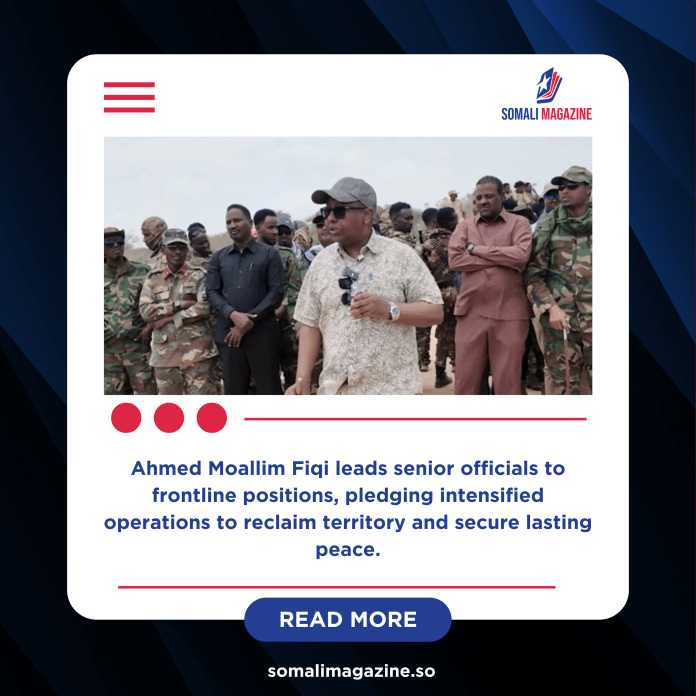Facebook Twitter (X) Instagram Somali Magazine - People's Magazine
Somalia’s Defense Minister, Ahmed Moallim Fiqi, has urged government forces and allied militias to push deeper into al-Shabab strongholds in Middle Shabelle as the federal government prepares for a new offensive against the militant group.
On Monday, Minister Fiqi led a high-ranking government delegation to front-line positions in the region, where Somali troops and local clan militia have been engaged in heavy fighting against the al-Qaida-linked insurgents. The delegation included Mogadishu’s mayor and Banaadir regional governor, Hassan Mohamud Hussein Muungaab, Chief of Army Staff Maj. Gen. Sahal Abdullaahi Omar, Member of Parliament Osman Mohamed Hadole, and other senior officials.
During his visit, Fiqi praised the bravery of soldiers and militia fighters, noting that recent advances had forced al-Shabab to retreat from several areas. He encouraged the troops not to slow down their momentum, stressing the importance of finishing the fight against the extremist group.
“The enemy is retreating, but it must be eradicated,” Fiqi said in a statement released by the Defense Ministry. “Our duty is to secure peace and stability for all Somalis.”
Preparations for a New Offensive
Federal officials say the government is now preparing for a large-scale operation aimed at reclaiming territory still under al-Shabab control in Middle Shabelle and neighboring Hiiraan. Both regions fall under the semi-autonomous Hirshabelle State, which has been a major battleground in the fight against the militants.
The upcoming offensive is part of a broader strategy by the Somali government to weaken al-Shabab’s presence in central and southern Somalia. The group, which has fought against Somali governments for more than 15 years, continues to hold pockets of rural territory where it imposes taxes, recruits fighters, and launches attacks.
Despite recent progress by Somali forces and their allies, concerns remain about the sustainability of these gains. Reports indicate that al-Shabab has managed to retake several key areas in recent weeks, raising fears that government advances may not hold without stronger coordination and lasting security measures.
Ongoing Threat
Al-Shabab remains Somalia’s most dangerous security challenge. The group has carried out frequent deadly attacks in Mogadishu, targeting government buildings, hotels, and public spaces. Its fighters also strike military bases and supply routes in rural areas, making it difficult for government forces to secure liberated towns and villages.
Even as the Somali military intensifies its ground operations, al-Shabab continues to use roadside bombs, ambushes, and suicide attacks to slow down government advances. Analysts say this cat-and-mouse style of warfare makes the fight more complicated, as gains on the battlefield can be quickly reversed if troops withdraw or lack reinforcements.
The federal government’s campaign has been supported by African Union peacekeepers and international partners, who provide training, intelligence, and air support. Together, they have helped Somali forces reclaim significant territory in the past two years. However, officials acknowledge that the final defeat of al-Shabab will require not only military strength but also stronger governance, local reconciliation, and economic opportunities for communities long affected by the conflict.
A Long Struggle Ahead
For more than a decade and a half, al-Shabab has maintained its insurgency, exploiting political divisions, clan rivalries, and poverty in Somalia. Despite losing control of major cities such as Mogadishu and Kismayo, the group has shown resilience by retreating into rural areas, where it continues to generate revenue through extortion and smuggling.
The Somali government hopes that the coming offensive in Middle Shabelle and Hiiraan will mark a turning point in the conflict. By clearing militants from these regions and strengthening state authority, officials believe they can reduce the group’s ability to regroup and launch attacks elsewhere.
As Defense Minister Fiqi reminded the troops, the fight is not just about military victory but also about ensuring lasting peace and security for ordinary Somalis. “Our duty,” he said, “is to protect our people and give them a future free from terror.”
For now, Somali forces and their allies face the difficult task of holding ground while preparing for an even bigger push into areas still controlled by al-Shabab. The coming months will be critical in determining whether the government can turn recent momentum into lasting stability.

